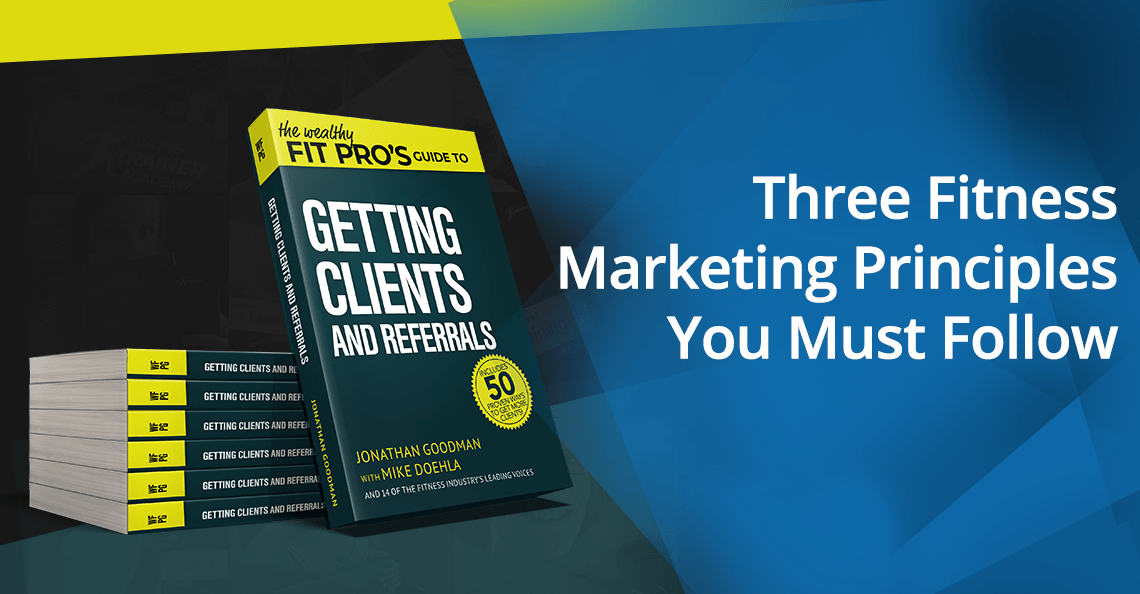The following excerpt is from The Wealthy Fit Pro’s Guide to Getting Clients and Referrals. Preorder your copy now and get the free audiobook and ebook delivered right away.
“Build something 100 people love, not something a million people kind of like.”
—Brian Chesky, cofounder of Airbnb
These marketing principles are for personal trainers looking to take their careers to another level. It’s what matters most.
Fitness marketing principle #1: You’re in the marketing business
You’ve heard the myth of the trainer who “just wants to help people” and “doesn’t care about money.” It permeates every aspect of the fitness industry and needs to stop.
You’re not a volunteer.
You’re a professional.
Professionals get paid for their work. Being passionate and helping people are not mutually exclusive.
Saying you don’t care about money is an excuse you make when you aren’t confident enough to charge what you’re worth.
If you’re offended by that statement, it’s probably true.
Nothing happens until you make a sale. You can’t make a sale until you market your business, asking for money in exchange for the value of your services.
Provide value, make money. It’s that simple.
Money is an amplifier. The more money you make, the more you can do to help others. Thus, if you want to help people, you need to make money, even if you don’t care about it yourself.
Take me, for example. I don’t particularly care about money. Or, more specifically, I don’t care about fancy things. I drive a 12-year-old car with 200,000 kilometers on it, I don’t own a watch, and all my favorite pastimes (hiking, biking, being with family) are free.
That said, I’m acutely aware of what money means to my company. The more we make, the more amazing things we can produce, and the more impact we have. I make millions not because I care about personally having millions. I do it because I know it’s the only way to help more people.
Whether you like it or not, you’re in the marketing business.
Fitness marketing principle #2: You favor abundance over scarcity
The scarcity mindset does more damage to potentially great trainers and businesses than any other mistake.
It goes like this:
You’re a trainer. Or you own a gym. Or perhaps you own a gym where you train clients. Whatever you do, you think so highly of your knowledge and methods that you don’t want to share any of it with anyone. They’re your “trade secrets,” after all. If anyone else can mimic what you do, they can encroach on your share of the market.
Because you see your market as finite, more for someone else means less for you. That’s why you believe your survival depends on defending every inch of your turf.
But the fitness business isn’t about individual silos. It’s about community. We all win when we work together, share knowledge and methods across disciplines, and forge profitable partnerships.
That’s aside from the fact that what you know and do probably isn’t much of a secret anyway.
Leave the scarcity mindset behind. Embrace abundance. Let it show and flow through all your branding and marketing. The fitness industry is massive. There’s ample business for everybody. Take your fair share, but don’t forget to share what you take.
Those who act abundantly, support others, give without any thought of what they’ll get in return, and don’t keep score soon realize what they get back is worth many times more.
Fitness marketing principle #3: You believe in attracting customers to you
The most successful trainers have prospects seeking them out. They practice “attraction marketing.” You may have heard the term before. It’s not new.
The concept is simple:
- You brand and market yourself in a way that makes you the obvious choice for prospects.
- You establish yourself as an expert within your prospects’ community.
- You do a great job and make sure everyone knows it.
- You treat your clients like all-stars.
Do all that, and your reputation precedes you.
This takes time, obviously. And yes, you’ll do some selling and following up with prospects as you build your brand and rep. But attraction is one of your marketing goals. You want people coming to you with money in their hands, asking you how to buy, and happy to pay whatever you charge.
Why people buy
Methods and tools change, but the reasons people buy remain the same. Merit is only one of those reasons, and rarely the deciding factor.
Yes, in some cases, consumers try to educate themselves on a product and the business that sells it. Car shopping is a good example. But most of the time, consumers make terrible, uninformed decisions. They rely on cues from others to justify their purchases.
It very much applies to your business. When someone shops for a trainer, a program, or a gym, this is the process in almost every case:
- They have a problem. It’s painful psychologically, and perhaps physically at well.
- They’ve had this problem for a while.
- They haven’t been able to solve this problem after repeated attempts.
- They want the problem to go away as quickly and easily as possible.
- They don’t know how to solve the problem, and it seems impossible to figure out the right steps.
- The problem sucks. More important, it feels like it’s always going to suck.
What happens next depends on how you’ve marketed yourself.
There’s little chance this person will find you by some random alignment of the stars. Sure, it’s possible they’ll walk into the gym where you work, at the exact moment you happen to be standing by the front desk.
But it’s far more likely they’ll seek you out because of something you did to catch their eye, something that established your worth. Maybe their cousin referred you. Maybe your niche matches up with their goal, and you’re the leading name in that niche. It could be any of a dozen things. Whatever it was, they found you and they want to talk.
What matters most is that their purchase rationale is already in place. They aren’t looking for a friends and family discount. They believe you’re the ideal choice, even if they’re not sure why.
Your job now is to reinforce their confidence. Don’t complicate things or give them an excuse to “think it over.”
True customer satisfaction will come later, when you give them great results. For now, you just need to make the process of hiring you as easy and frictionless as possible.
Final thought: Marketing is adding value, not trickery
Marketing doesn’t mean manipulating people into doing things they don’t want to do.
Ethical marketing is simply identifying a need, making yourself the go-to person for that need, and then finding ways to stay front of mind for people who have that need, for as long as it takes. When one of them decides they want to hire a trainer, you’re positioned as the obvious choice.
That’s why it’s so important to think ahead. Don’t wait to make your market. Build your communities. Develop your reputation. Dig the well before you’re thirsty and you’ll control your fate.
Get More Personal Training Clients and Referrals!

Are you a personal trainer who’s struggling to fill your schedule with paying clients? Confused about how to market yourself without spending a lot of money?
The Wealthy Fit Pro’s Guide to Getting Clients and Referrals has the answers. Let Jonathan Goodman show you:
- Why people pay for fitness when they can get it for free (p. 1)
- How to get more people to buy from you (p. 28)
- How to succeed in fitness marketing without really trying (p. 59)
- 3 fitness marketing principles you must follow (ignore them at your peril) (p. 77)
- 7 components of compelling offers that leave clients begging to buy (p. 89)
- Savvy long-term client conversion strategies (p. 99)
- Fast one-off promotions for new clients (p. 137)
- Multimillion-dollar guerrilla marketing secrets revealed! (p. 181)
- Guaranteed systems, strategies, and scripts for generating referrals (p. 207)
- Includes: 50 proven ways to get more clients
Order this book in paperback today and get the audio and digital versions 100% FREE (a $40 value).
It all starts by clicking here: The Wealthy Fit Pro’s Guide to Getting Clients and Referrals











